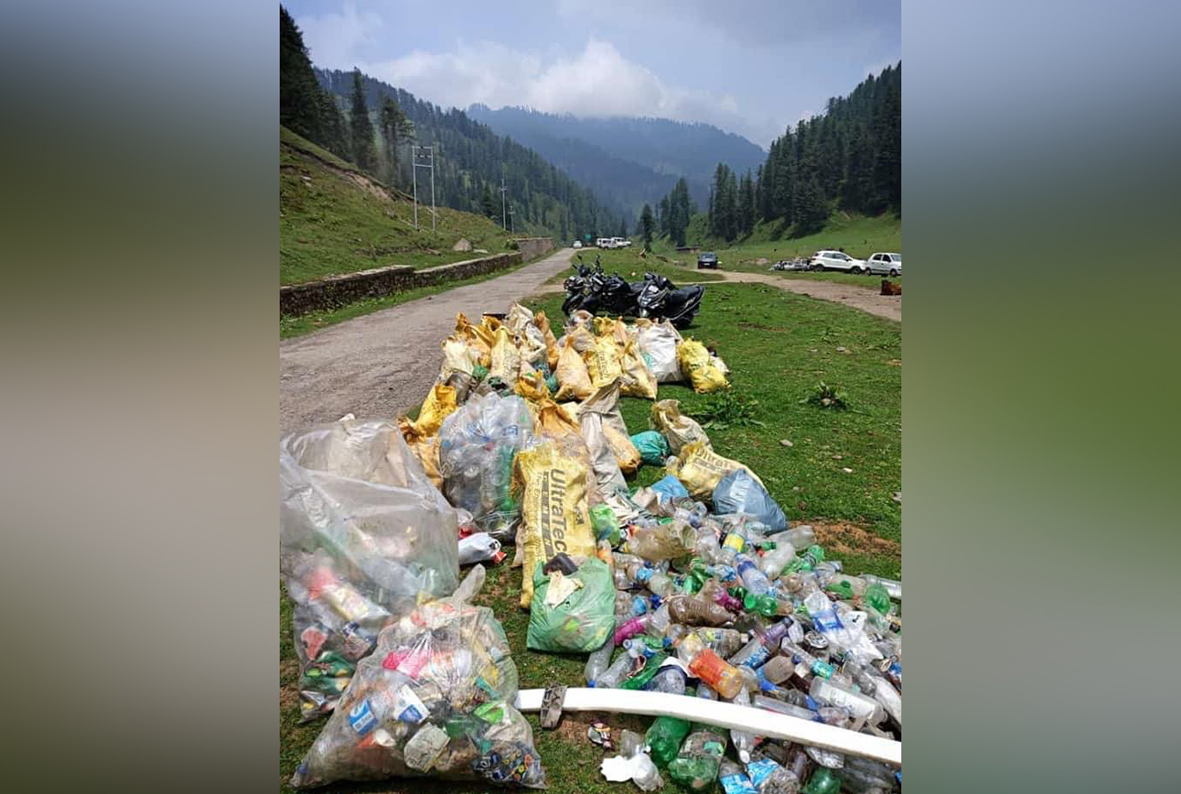Dr Atif Javed Qazi
Bhaderwah is a small valley-town in Doda 210 kms away from Jammu. Bhaderwah valley is predominantly a mountainous torrid town situated 80 kms from Batote.
It offers to the tourist a variety of beautiful landscape, colourful local fairs, important festival mood and unique mosaic culture, extremely and pleasant summer temperature which ranges from 18 degrees to 32 degrees. Popularly called Chhota-Kashmir, it has bewitching natural beauty which enthralls any visitor. Since lot of efforts are done by locals to promote Bhaderwah as a tourist destination and has started gain popularity in the tourist map of Jammu and Kashmir UT still there are lot of unexplored destinations which are not in the knowledge of tourists. However, this beautiful spot is beset with numerous problems. One of them is pollution.
Plastic pollution is one of the major environmental challenges of our time, and tourism plays an important role to play in contributing to the solution. The science is clear, plastics are, after carbon, arguably our number one environmental threat.
Plastic pollution is becoming a growing concern on Bhaderwah tourism sites. With the expansion of the tourism industry waste increasingly originates from tourism activities and ends up into the waters due to poor management of solid waste post- consumption. Unquantified amounts of plastic materials are being discharged into waters and have detrimental effects on local marine environments.
There is urgent need to make tourist and residents aware about the source, amount, and type of waste materials in Bhaderwah, by observing tourism activities, littering behaviors, and existing solid waste facilities. The authorities further needs to make efforts to make people aware and illustrate the relationship between waste management and tourism that is key concern in Bhaderwah . The data about the study was obtained through personal visits, interviews, and observations at various tourism sites and the findings suggest that plastics waste is produced to a considerable extent by tourists.
Various factors contribute towards soil and water pollution in Bhaderwah ranging from improper littering practices, to inefficiency of existing regulations in the waste sector by concerned authorities , cultural barriers and social norms, or scarce provision of recycling services. Based on the fact, that tourism emerges as a major factor that accounts for the largest water and soil pollution and that such quantity of waste was never seen on tourist destinations like Jai Valley, Padri Dhar, Guldanda, Nalthi Park, Lake View Park and various other surroundings before the introduction of tourism sector in Bhaderwah. The explanation for the role that tourism plays a leading role is that the production of waste from the tourism sector remains unregulated and unsurveyed and that makes it a big reason to worry.
After deep introspection of the issues it is clearly visible that there are limited efforts made to bridge knowledge gap of scale and distribution of soil water and plastic pollution. There is an urgent need of serious attention towards the issue that requires immediate broader investigation which can foster the implementation of sound changes to the existing tourism waste management system including behavioral, regulations, and policy changes.
The awareness about the relationship between waste and tourism by investigating to what extent tourists and tourism infrastructures do contribute to increased generation of plastics waste in Bhaderwah is need of the hour.
Proximity of food and other waste-generating activities near rivers, such as in the case of the Lake view tourist Park and Nalthi tourist park, can have detrimental effects by accounting for large amounts of single-use plastics to leak into the river.
Uncontrolled dumping of waste seems to have been a problem in Bhaderwah. In fact, it is a common practice for local residents, shop keepers to disseminate waste into river near Jamia Masjid bridge area, Chanote bridge area, Chakka bridge area and more over street sweepers and waste pickers too discharge trash generated from various activities (e.g. single-use plastic plates, cups, cutlery, straws, and containers) into city that are connected to river waters.
Low rate of plastics recycling is contributing factor to soil and water pollution. At present, Municipal Committee Bhaderwah is the only organisation that is responsible for plastics waste management in town and Bhaderwah Development Authority responsible for dealing with waste in tourist sites.
The authorities should immediately come up with a solution for the presence of various push factors towards leakages into the environment and soil/water pollution in Bhaderwah like:
(i) Location of food and waste-generating activities,
(ii) Recycling rate,
(iii) Social norms, and
(iv) Soil and marine littering.
Scarcity of facilities capable of dealing with plastics and other recyclables causes such materials to leak into the environment. A proper recycling plant is the need of our to save this paradise.
Suggestions
(i) Ban single-use plastics from beaches,
(ii) Littering tax
(iii) Waste segregation at source.
I believe that these above mentioned three approaches could reduce the amount of plastic waste leaking into environment on one hand, and generate revenues from recycling on the other by turning plastics waste into an economic opportunity.
Various other policy options to reduce marine littering on long term basis in Bhaderwah include:
(i) Post-consumer waste management,
(ii) Stakeholder engagement, and
(iii) Management of waste facilities on/near destinations.
Knowledge and information gaps of how municipal and tourism sectors in Bhaderwah manage waste internally lead to lack of system transparency and subsequent inability to propose sound solutions.
Besides, Bhaderwah Development Authority and Bhaderwah Municipal Committee should become more active to counter the emerging threat to people and environment of Bhaderwah.
(The author is Lecturer, TBS Bhaderwah Campus)
Trending Now
E-Paper


